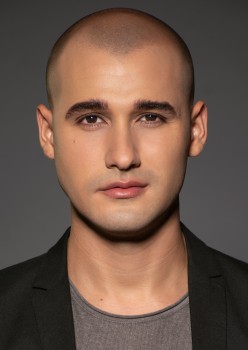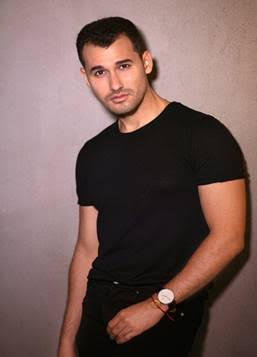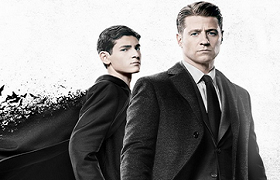TV Interview!

Interview with Carlo Arrechea of “S.W.A.T.” on CBS by Suzanne 7/22/20
This was a very nice chat with up-and-coming young actor Carlo Arrechea. Although he has quite a Cuban accent, I had no problem understanding him. He was really interesting to speak to.
Here is the audio version of it. Here is the transcript:
Suzanne: I’m good. I’m doing well. So you’re in California?
Carlo: I am. What about you?
Suzanne: I’m in a little town you never heard of in Arkansas.
Carlo: Okay, so what’s the time zone – is it eastern time?
Suzanne: Central.
Carlo: Central time, Okay, okay.
Suzanne: Yeah, yeah, actually, I’m actually from San Diego originally, so…
Carlo: Okay.
Suzanne: …but we live here now.
Carlo: Nice. That was actually the first city from California I ever visit before leaving LA. I loved it. I fell in love with San Diego.
Suzanne: Oh, yeah, it’s wonderful there. It’s expensive to live there, though.
Carlo: It is, it is. I mean, nowadays, everywhere, I think is.
Suzanne: That’s true. Yeah, everywhere worth living. Definitely. So you started acting when you were very young, right?
Carlo: Yeah. When I was six.
Suzanne: Six, wow.
Carlo: Yeah, maybe even before, but like my first TV role in Cuba was when I was six.
Suzanne: Wow. And I think I read that your your parents and grandparents also were actors?
Carlo: Yeah, my mom was an actress in Cuba, and my grandfather was an actor as well. They both gave up. My mom, when when we moved to Miami, she gave up, because, you know, it was a lot to – it’s like starting from zero, and also the accent, because let’s say, Miami, if you want to do Latino market, you have to speak like natural Spanish and, you know, a lot of stuff is different. So, she was like, “You know what,? I don’t want to continue acting.” And my grandfather, actually, he was a professional actor since I think 17 or 16, but he gave up, too. He became a teacher. So, yeah, so [unintelligible] and, you know, to continue and everything that I do, it’s not only for my calling and my passion, it’s also because of them, you know?
Suzanne: Right. Yeah. Well, a lot of actors, yeah, just don’t make it, and you just never know. And I think you’re right, that, you know, you have to keep going and going and see what happens. Especially when you’re young.
Carlo: Yeah, you have to. I mean, if you have that, you know, that flame in your heart, you have to keep going in. You know, you’re gonna get a lot of nos but you’re gonna get that yes that’s gonna change your life, you know. So, yeah, never give up on your dreams.
Suzanne: Yeah, that’s true. Well, and a lot of people do. They change as they get older; they change what they think they want to do. And so you just never know what life is gonna hand you.
Carlo: I also think you have to be open, you know, to be open if you have, I don’t know, you have a higher purpose or a higher calling or just a change, you know, also to be open to that, but as long as you have it in you, I think you should definitely don’t give up.
Suzanne: Right. Now, your family moved to Miami in 2002. Can you can you tell us about that? How did that work?
Carlo: So, um, so my mom, we won the visa lottery.
Suzanne: Oh, okay.
Carlo: Yeah, we were very blessed. And so we left Cuba in 2002. And, you know, honestly, since day one, I felt that I was at home, you know, even that I had to learn English and to adapt to a new country, but I felt like I was home, you know, so much abundance and diversity and, I don’t know, it’s just different energy, you know?
Suzanne: Yeah. Miami’s a great city.
Carlo: Yeah, it’s full of Cubans.
Suzanne: Yeah, it is.
Carlo: I felt like I was home without Castro.
Suzanne: Right. Well, it’s a very exciting city. There’s a lot of color and partying, and just it’s a fun place.
Carlo: Yeah. A lot of flavor.
Suzanne: Definitely. And so, I didn’t even know there was a visa lottery. That’s interesting. I have to read more about that.
Carlo: Yeah. I don’t know if that’s still happening with, you know, so many changes. But yeah, and it’s funny because my mom, when she – I don’t know how to say like, she played the visa lottery, or she, I don’t know, she signed the papers. I don’t know, that was actually, I think it was 1998.
Suzanne: Oh, okay.
Carlo: So, yeah, and it was funny, because she even, you know, forgot about it. Like she didn’t even know that. You have to wait so many years, but it was a beautiful surprise.
Suzanne: Sure, sure. I was going to say something, now I forgot….. Oh, well. So you didn’t know English before you moved here?
Carlo: Not at all; I didn’t. So, the first thing, when I started school in Miami, they have a program. It’s called ESL, English as a second language. So, yeah, that was, you know, I had like a few classes in English, but most of the classes, they were like, like the teacher, I think, was required to speak Spanish as well, you know, to help the kids. So, yeah, so I had to learn the language. And the only thing that I think I regret, but I mean, it’s part of my journey, is that when you have, you know, so many teachers and a lot of, you know, friends or students that they speak Spanish, you just want to hang out with them.
Suzanne: Right.
Carlo: So, um, I don’t know, I think, I don’t know, if I could change something, it would be like try to speak English as much as you can, you know, especially because this is your new home.
Suzanne: Right.
Carlo: I mean, don’t forget your Spanish but, you know.
Suzanne: No, I understand you completely. I think that’s the problem. What happens with a lot of Latino immigrants is they’re in their own family and their own community and other students, and they don’t learn it as quickly as say somebody from, I don’t know, Vietnam or something that are stuck in the middle of an area where there are no other people that speak his language, for instance, you know?
Carlo: Yeah. I mean, no, it could be very controversial, this, but I just think that you come to, you know, a new home. Also, it doesn’t mean that you have to change who you are, but also adapt.
Carlo: So yeah, like don’t forget who you are, but adapt and learn the language.
Suzanne: Right, right. Yeah, I understand. I was a teacher for a while in California, and we had – actually, I don’t speak Spanish that well, but I was sort of, not a substitute teacher, but you know, I had a whole class that spoke Spanish and tried to teach the math and it was all different levels of how much English they knew. So, it was difficult, but we did have a couple of kids that were not Spanish speakers, but they spoke another language. And I think they learned faster, because like, we were just talking about they were immersed in English only, and so they had to learn, you know?
Carlo: Yeah. And I think you will take advantage of that when you when you get older as well.
Suzanne: Yeah, no, it’s definitely advantageous to learn the language of the country you’re in.
Carlo: Of course.
Suzanne: And I remember what I was going to ask you; it was about… do you remember a few years ago, when they lifted the visiting Cuba ban… did anyone in your family go back and visit? Or…?
Carlo: No, no, to be honest, no. My family has their own point of view. And I respect that, you know, they left Cuba even before I was born. So actually, in Cuba, it was only my mom and my grandfather. My father died in a car accident when I was 17 years born.
Suzanne: Oh, I’m sorry.
Carlo: So, I didn’t even get to know him. Yeah, so all my family, especially from my mom’s side, they were all in the states in Miami. And they have their own, you know, point of view. They don’t want to go back to Cuba, and I respect it. I understand. So, yeah, no one has been back.
Carlo: So, if they lift that ban again, are you going to go back and visit sometime maybe?
Carlo: You know, I would like to, because, you know, it’s the place that I was born, and I feel very proud of my roots, you know, even that my home is United States, and I’ve lived longer here now. But I would like to, yeah, of course. You know, I want to like feel, now that I’m older, I’m an adult now, I want to feel, you know, that flavor, the Cuban people, the Cuban energy, but at some point. And I would love actually even to film something there. So, that would be nice. Yeah.
Suzanne: Yeah, that would be nice. I’d we’d like to visit there sometime too. We were thinking about it, and then it didn’t last very long, unfortunately, the lift of the ban.
 Suzanne: I watched your episode of “SWAT;” you were really good.
Suzanne: I watched your episode of “SWAT;” you were really good.
Carlo: Thank you. Thank you so much. I feel very blessed and grateful because of this. I mean, this was my US primetime debut, and I’m also a contender for an Emmy. So, I will find out all that next week. So, I’m very excited.
Suzanne: Oh, great. That’s great; I hope you get it. So, did you already know how to box before that episode?
Carlo: No, I never boxed in my entire life, and I had a great team coaching. I also hired a coach before the audition when I went to casting, so I wanted to, you know, feel confident, as much as I could. And then when I booked the role, they actually had me with with this amazing team that I was rehearsing every day, and because we were doing – so we shot this this episode like in the middle of December, and then we had like a holiday break, the Christmas break. So, in that break, it was, you know, it was perfect timing, because I was like non stop training. And then we shot all the boxing scenes in beginning of this year. So, it was perfect timing. So that’s why, I guess, it looks real.
Suzanne: It does, it does. And now did they make you shave your head for that role? Or did you already wear it that way?
Carlo: So actually, because I audition with – I had probably like, not long, not like I haven’t now, but I had, you know, yeah, they made me shave my head. They asked me, and I was like, “Yes.”
Suzanne: Okay. Sure. Whatever you need, right?
Carlo: Yeah, whatever you need. I just wanted you know, and it also helped me to embody that character, shaving my head.
Suzanne: Yeah, I guess a lot of boxers do that now so like people can’t grab their hair or something. I don’t know. I have no idea. But so what was the cast and crew like?
Carlo: The what?
Suzanne: The cast and the crew of “SWAT.”
Carlo: Oh, “SWAT.” Oh my god. They were, wow, they were so warm. Like I felt like it was like my family, you know? Like the writers, they were so happy to have me; the cast were so nice and helpful. I don’t know, it was like, I think, I mean, I’ve been working since little, but “SWAT,” it’s been like, I think, one of the most special experiences in my life, because everyone was so nice and sweet and like, whatever you need. They were there, you know?
Suzanne: That’s nice. yeah. You didn’t have any scenes with Shemar Moore, did you? I can’t remember.
Carlo: I did not. I did not, no.
Suzanne: But you did meet him though?
Carlo: Yeah, but I met him. He was so nice.
Suzanne: He’s a nice guy. I met him in the 90s. We were living in Riverside, which is near LA, and he and a bunch of other celebrities came out for a softball game against local, so my husband was playing on other team.
Carlo: Oh, nice.
Suzanne: Yeah, and he used to be on a show called “The Young and the Restless.” It’s a soap opera.
Carlo: Yeah, I heard.
Suzanne: So, he was on that at the time. And I watched that. So I was like, “Oh, I got my picture taken with him.” So, I’m glad he was nice.
Carlo: He’s gentleman. He’s such a great guy.
Suzanne: Yeah, I know. He’s really nice to his fans on Instagram and Twitter, too.
Carlo: Yeah, he is; he definitely is.
Suzanne: So, working on “SWAT” was a lot different than working on other shows that you’ve been on.
Carlo: It was very different to be honest. The only thing that is the same is the passion. You know, my passion for acting and energy. But it was just different, because, I don’t know. It’s just, I don’t want to throw anything into, you know, in the bus.
Carlo: But, it’s just different, because, you know, we work with unions. We have the SAG-AFTRA here in the English market, in the US market. And even though you don’t – in Miami, I shot a Nickelodeon show for the Latino market for almost three years. It’s just different, you know. It’s another, not lifestyle, but it’s another –
Suzanne: Right, I know what you mean.
Carlo: Another level.
Carlo: Another level, to be honest.
Suzanne: Well, they have a higher budget, I imagine; that probably helps.
Carlo: And they have a huge budget, especially for this episode. Yeah, so I guess money motivates.
Suzanne: It does. Unfortunately, it does. Do you have anything else coming out or that you’re working on?
Carlo: Well, everything’s stopped.
Suzanne: Right.
Carlo: You know, everything is stopped; however, everything started to pick up. I have something cooking. I cannot say it yet, because, you know, they don’t let me, but it’s very exciting. Very different from “SWAT” and from the Nickelodeon and from everything that I have done. So, I’m very excited about that. Yeah, I just can’t wait to start, because I mean, it’s been said, I mean, it’s co-creating and, you know.
Suzanne: Yeah. What have you been doing it at home in the last three months… or is it four months?
Carlo: Yeah, so I know. I don’t even know –
Suzanne: I know. What day is it? I don’t know.
Carlo: Yeah, so I’ve been reading a lot, working on myself, you know, my mental health, to be honest, improving myself. I love to meditate. So, I’ve been doing that a lot. Working out. I adopted a puppy. So, he became my entire life now. And, you know, just becoming better day by day and trying to stay positive, you know, and lead by example.
Suzanne: So are you on Instagram?
Carlo: Yeah, I am.
Suzanne: Let’s see under –
Carlo: Carlo Arrechea.
Suzanne: Just under – yeah, you’re probably the only one. There you are. Okay. So have you posted some pictures of your puppy on there?
Carlo: No, I have not. I posted on Insta story.
Suzanne: What’s –
Carlo: Like the stories that last for 24 hours..
Suzanne: Oh, the story on Instagram. Okay, I’ll check that out. I want to see the puppy. All right. Well, thank you very much. I really appreciate you talking to me today.
Carlo: Thank you so much for having me. It means a lot, you know having the support and the love from the US press. So, it means a lot to me. Thank you so much.
Suzanne: Good luck on the Emmy. I’ll be pulling for you.
Carlo: Thank you. Thank you. I’m so excited. I’m anxious. I’m excited. I have so many mixed feelings, but whatever happens, you know, just to be there already, it means a lot, you know?
Suzanne: Yeah. Okay. Thank you. Talk to you later.
Carlo: Thank you so much. Bye, Suzanne.
Suzanne: Bye bye.
Transcribed by Jamie of http://www.scifivision.com/
MORE INFO:
Sizzling hot Havana, Cuba-born bilingual actor Carlo Arrechea is a star on the rise in Hollywood, recently making his U.S. prime time debut in the CBS hit TV  series S.W.A.T. where he portrayed ‘Gio Torres’, a middleweight Cuban boxer, aka “The Caribbean King.” In the series, Torres is a prize fighter set to win a huge upcoming match when his pregnant wife if kidnapped and held for ransom. He enlists the S.W.A.T. team and works with them to retrieve his wife right in time for the delivery of their first child. The heartfelt role has garnered him much media attention and was one that was especially significant to him as it tied back to his Cuban roots.
series S.W.A.T. where he portrayed ‘Gio Torres’, a middleweight Cuban boxer, aka “The Caribbean King.” In the series, Torres is a prize fighter set to win a huge upcoming match when his pregnant wife if kidnapped and held for ransom. He enlists the S.W.A.T. team and works with them to retrieve his wife right in time for the delivery of their first child. The heartfelt role has garnered him much media attention and was one that was especially significant to him as it tied back to his Cuban roots.
A third-generation actor, Arrechea’s career began at the age of 6 when he played the son to his biological mother in a telenovela in his home country of Cuba. He fell in love with the craft and was selected as one of the stars of the children’s show “Los Chicos Altura” (“The High Kids”). In 2002 his family moved to Miami and he faced a culture shock that made him rethink acting. He decided to study psychology in college but dropped out after only one semester to return to his true passion. It was during this time that he got into theater and started receiving a lot of attention for his stage performances including “El Solar de la Palangana de Oro” by Raúl de Cárdenas, a work that opened many doors for him and earned him press coverage as the “new face of acting” by People en Español.
From theater, he jumped into television where he began with small roles in well-known Telemundo and Univision telenovelas  such as “Más saber el diablo”, “El Cartel 2” and “Alguien te Mira”. He also starred in two short films, “Fate’s Decree” directed by Michael Ruiz and the super production “El Manantial”, with renowned Sam Bradley as director. His career thus began to roll, and his name to be known on the Miami scene. Not long after he was cast in the successful Nickelodeon Latin America series “Grachi” which he starred in for three seasons (152 episodes). It was during this time that he also starred in his first leading film role in the romantic comedy La ReBúsqueda, the highest-grossing Salvadoran film in the country’s history.
such as “Más saber el diablo”, “El Cartel 2” and “Alguien te Mira”. He also starred in two short films, “Fate’s Decree” directed by Michael Ruiz and the super production “El Manantial”, with renowned Sam Bradley as director. His career thus began to roll, and his name to be known on the Miami scene. Not long after he was cast in the successful Nickelodeon Latin America series “Grachi” which he starred in for three seasons (152 episodes). It was during this time that he also starred in his first leading film role in the romantic comedy La ReBúsqueda, the highest-grossing Salvadoran film in the country’s history.
After his success in Latin America, Arrechea decided to move to Los Angeles to begin his crossover into the U.S. market. Throughout his acting career, he has starred in several television commercials, including the Johnnie Walker national commercial which toasts to immigrants and highlights their grueling path towards citizenship. He is a member of SAG-AFTRA and is an alumnus of the Stella Adler Academy of Acting. As a Cuban-born actor, Arrechea has always looked up to the original Latin Comedy star Desi Arnaz and a dream role for him would be to reprise the role of ‘Ricky Ricardo’ in a comedy series or film.
In his free time Arrechea enjoys reading, meditating, and exercising, and sees every day the opportunity to grow and improve in all aspects. He also enjoys volunteering for The Ronald McDonald House, where he feeds, plays games, and speaks with children and parents who have seriously ill children or family members in hospital.
Proofread and Edited by Brenda
Follow Us!
